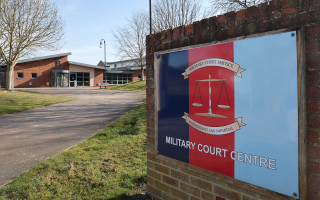Hundreds More Afghan Workers And Families To Be Fast-Tracked Into UK
Hundreds of Afghans who worked for the British military during the conflict against the Taliban, mostly as interpreters, are to be allowed to resettle in the UK for their own safety under a new fast-track scheme.
Defence Secretary Ben Wallace said it was only right to relocate Afghans and their families who were at risk with NATO troops preparing to leave Afghanistan.
The scheme, the Afghan Relocations and Assistance Policy, was officially launched earlier this year but will now be accelerated.
Including the workers' family members, some 3,000 more Afghans are expected to settle in the UK under the plan.
More than 1,400 Afghans and their families have already relocated to the UK, and hundreds more have received funding for education and training.
Mr Wallace said: "With the Western powers leaving Afghanistan, the threat is increasing and has increased, with targeted attacks against Afghans by the Taliban.
"We think it's the right thing to do, to stand by these people.
"They sacrificed a lot to look after us and now we're going to do the same."
Veteran Army officer Ed Aitken, the founder of the Sulha Alliance campaign group, said he was "pleased" about the scheme but warned that there was a "low" bar for rejecting those who previously risked their lives to support British troops.
"We are pleased with where we are but there are concerns there are some glaring gaps where there are going to be parts of this community who are left vulnerable and won't be included under this policy," Mr Aitken, who did two tours of Helmand Province, told BBC Radio 4's Today.
Those dismissed from their post, which amounted to 1,010 of those employed – "around 35%", according to Mr Aitken – will not be eligible for relocation except on a case-by-case basis.
Describing the scale of those who had their employment terminated as "a problem with HR management", he added: "If you compare the bar for asylum seekers to be rejected from asylum in the UK, the bar is incredibly high.
"Now, if you compare that bar for rejecting Afghan interpreters, it is clearly trying to be set quite low, the idea that minor offences (can prevent access to the scheme)."
The issue has been in the spotlight since British forces ended combat operations in Helmand in 2014.
Earlier schemes had involved strict criteria on who could apply to live in the UK, and considered factors such as length of service and precise roles.
The new Government policy says any current or former locally employed staff assessed to be under serious threat to life will be offered priority relocation to Britain, regardless of their employment status, rank or role or length of time served.









